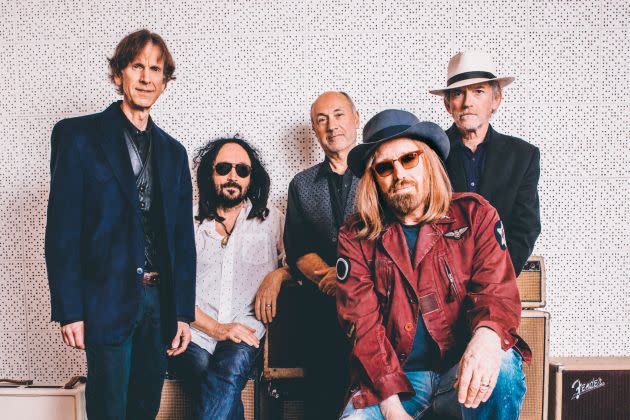Mudcrutch Finally Find Their Groove: Inside Their First U.S. Tour
- Oops!Something went wrong.Please try again later.
- Oops!Something went wrong.Please try again later.

During his 25 years living in Nashville, Tom Leadon has seen countless shows at the Ryman Auditorium. But the rail-thin 64-year-old has never stepped onstage – until tonight. Leadon, who has spent the past few decades working as a guitar teacher, recently went on hiatus from his day job after his old buddy Tom Petty called him up to get their teenage band, Mudcrutch, back together for their first-ever U.S. tour.
For the group’s May 27th show, Leadon grins as he rips solos during the Flying Burrito Brothers classic “Six Days on the Road” and sings lead on the bluegrass rocker “The Other Side of the Mountain” for a crowd that includes dozens of his guitar students, many close friends, Lucinda Williams and his brother Bernie, a founding member of the Eagles. “I keep waiting for somebody to tap me on the shoulder and go, ‘Uh, Tom, this is a dream and it’s time to wake up,'” says Leadon. “What a wonderful turn of events this is.”
More from Rolling Stone
Tom Petty, Rock Iconoclast Who Led the Heartbreakers, Dead at 66
See the Killers Cover Tom Petty With Eddie Vedder at Ohana Fest
Mudcrutch feature Petty on bass and fellow Heartbreakers Mike Campbell and Benmont Tench on guitar and keyboards, respectively – along with Leadon and drummer Randall Marsh, who spent his post-Mudcrutch years playing in various bands, including Campbell’s side project the Blue Stingrays. (Guitar ace Herb Pedersen also joins the band for this tour.)
Mudcrutch built their name playing six days a week at a popular Gainesville, Florida club that featured topless dancers. Leadon, one of Tom Petty’s closest friends since childhood, was thrown out of the band in 1972 after getting into a heated fight with the owner of the club. The group moved to Los Angeles a couple of years later with a slightly revised lineup that featured Danny Roberts on vocals and guitar and Charlie Souza on bass. They signed a deal with Shelter Records, but were dropped after “Depot Street,” their lone single, failed to chart. “We had all this energy at first,” says Marsh. “But then we lost some people and things got switched around. The very end was a little dark.”
The band split up in 1975, but the label retained Petty as a solo artist, and he recruited Campbell and Tench to join his new backing group the Heartbreakers. That band didn’t include Marsh, whose drumming didn’t impress the label president. But Petty became nostalgic about his first band while watching raw footage of Leadon’s interview for Peter Bogdanovich’s 2007 Petty documentary, Runnin’ Down a Dream. “I just realized how much we loved each other,” says Petty. “We taught each other so much and I thought, ‘Why don’t we just share that again?'”
He called Leadon out of the blue, and caught him in the car while he was driving home from the grocery store. “I hadn’t talked to Tom on the phone in about 30 years,” says Leadon. “I didn’t believe it was him for a while. I thought one of my friends was playing a joke on me, but he kept talking until I recognized his voice. Then I pulled over to hear him better and after a while my frozen food began melting.” Petty laughs at the memory. “I think I freaked him out,” he says. “It’s a weird call to make, right? But I wanted to try it. I figured if it didn’t work out, we just wouldn’t do it.”
It worked out far better than Petty even dared imagine. The band cut a record in a little over a week. “I don’t usually play my stuff, but I play that one,” he says. The album got rave reviews, and they supported it with a very brief California club tour. “As soon as we started playing with them again,” says Leadon, “it felt like we were home.” But the Heartbreakers had a big tour on the horizon and there was no time for more Mudcrutch shows.
Best of Rolling Stone
